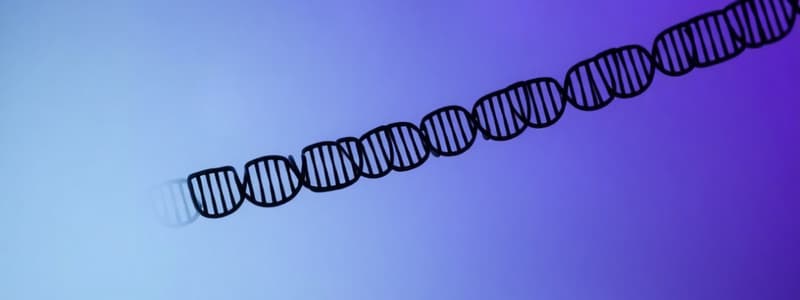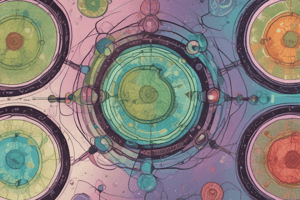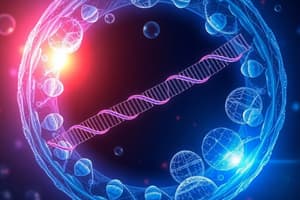Podcast
Questions and Answers
Which phase of interphase involves DNA replication?
Which phase of interphase involves DNA replication?
- G1
- Mitosis
- G2
- S (correct)
Cytokines are solely responsible for cell division.
Cytokines are solely responsible for cell division.
False (B)
What is the primary function of mitosis?
What is the primary function of mitosis?
To produce two genetically identical daughter cells.
During the ______ phase of interphase, the cell grows and synthesizes proteins.
During the ______ phase of interphase, the cell grows and synthesizes proteins.
Match the following phases of the cell cycle with their descriptions:
Match the following phases of the cell cycle with their descriptions:
What type of cytokine is involved in regulating inflammatory responses?
What type of cytokine is involved in regulating inflammatory responses?
Interphase is a period of inactivity in the cell cycle.
Interphase is a period of inactivity in the cell cycle.
Name one function of cytokines.
Name one function of cytokines.
In the ______ stage of mitosis, the chromosomes condense and the nuclear envelope breaks down.
In the ______ stage of mitosis, the chromosomes condense and the nuclear envelope breaks down.
What occurs at the G2 checkpoint of interphase?
What occurs at the G2 checkpoint of interphase?
During which phase do sister chromatids separate and move towards opposite poles?
During which phase do sister chromatids separate and move towards opposite poles?
Cytokinesis occurs during the anaphase stage of mitosis.
Cytokinesis occurs during the anaphase stage of mitosis.
What is the role of checkpoints during mitosis?
What is the role of checkpoints during mitosis?
In telophase, the nuclear _____ reforms around each set of chromosomes.
In telophase, the nuclear _____ reforms around each set of chromosomes.
Match the following phases of mitosis with their descriptions:
Match the following phases of mitosis with their descriptions:
What happens to the chromosomes during telophase?
What happens to the chromosomes during telophase?
Errors at the checkpoints can lead to normal cellular division.
Errors at the checkpoints can lead to normal cellular division.
Define cytokinesis.
Define cytokinesis.
The _____ plate is the imaginary plane where chromosomes align during metaphase.
The _____ plate is the imaginary plane where chromosomes align during metaphase.
What is a potential consequence of malfunctions at the mitotic checkpoints?
What is a potential consequence of malfunctions at the mitotic checkpoints?
Flashcards
Interphase
Interphase
The longest phase of the cell cycle, between cell divisions, characterized by growth, protein synthesis, and DNA replication.
G1 Phase
G1 Phase
The first gap phase of interphase, where the cell grows in size and synthesizes proteins, before DNA replication.
S Phase
S Phase
Synthesis phase of interphase, where DNA replication occurs, ensuring identical copies for daughter cells.
G2 Phase
G2 Phase
Signup and view all the flashcards
Cytokines
Cytokines
Signup and view all the flashcards
Mitosis
Mitosis
Signup and view all the flashcards
Prophase (Mitosis)
Prophase (Mitosis)
Signup and view all the flashcards
Prometaphase (Mitosis)
Prometaphase (Mitosis)
Signup and view all the flashcards
Daughter Cells
Daughter Cells
Signup and view all the flashcards
Cell Cycle
Cell Cycle
Signup and view all the flashcards
Metaphase
Metaphase
Signup and view all the flashcards
Telophase
Telophase
Signup and view all the flashcards
Cell Checkpoints
Cell Checkpoints
Signup and view all the flashcards
Chromosome segregation
Chromosome segregation
Signup and view all the flashcards
Mitosis errors
Mitosis errors
Signup and view all the flashcards
Metaphase plate
Metaphase plate
Signup and view all the flashcards
Sister chromatids
Sister chromatids
Signup and view all the flashcards
Spindle fibers
Spindle fibers
Signup and view all the flashcards
Study Notes
Interphase
- Interphase is the longest phase of the cell cycle, encompassing the period between cell divisions.
- It is not a period of inactivity but a time of significant cellular activity and preparation for division.
- Interphase is divided into three phases: G1, S, and G2.
- G1 (Gap 1): The cell grows in size, synthesizes proteins, and carries out normal metabolic activities. Critical regulatory checkpoints ensure the cell is healthy and prepared for DNA replication.
- S (Synthesis): DNA replication occurs, ensuring that each daughter cell receives a complete and identical copy of the genetic material. Histones are produced and assembled.
- G2 (Gap 2): The cell continues to grow, synthesizes more proteins and organelles, preparing for mitosis. Another critical checkpoint verifies that DNA replication is complete and accurate.
- The cell is highly active during interphase, growing, producing proteins, and replicating DNA to ensure accurate division in the next phase.
Cytokines
- Cytokines are a broad and diverse group of signaling proteins secreted by various cells of the immune system and other cell types.
- They function as important mediators in mediating immune responses, regulating cell growth, and promoting tissue repair.
- Cytokines act as messengers, transmitting signals between cells to regulate inflammation, immunity, and cell growth.
- They play a pivotal role in many physiological processes, including immune responses, cell differentiation, inflammation, and apoptosis.
- There are various categories of cytokines based on their function, including interferons, interleukins, chemokines, and growth factors.
- Examples of cytokine functions include:
- Regulating inflammatory responses
- Activating immune cells
- Stimulating cell growth and differentiation
- Promoting tissue repair and remodeling
- Many cytokines are involved in orchestrating complex cellular communication networks.
Mitosis
- Mitosis is the process of nuclear division in eukaryotic cells.
- It results in two genetically identical daughter cells from a single parent cell.
- Mitosis is crucial for growth, repair, and asexual reproduction in organisms.
- The stages of mitosis:
- Prophase: The chromosomes condense, the nuclear envelope breaks down, and the spindle fibers begin to form.
- Prometaphase: The spindle fibers attach to the chromosomes at the kinetochores, structures located near the center of each chromosome. Chromosomes move to center of cell.
- Metaphase: The chromosomes align along the metaphase plate, an imaginary plane equidistant from the two poles of the cell.
- Anaphase: The sister chromatids separate and move towards opposite poles of the cell, pulled by the spindle fibers.
- Telophase: The chromosomes arrive at the poles, the nuclear envelope reforms around each set of chromosomes, and the chromosomes begin to decondense.
- Cytokinesis is the division of the cytoplasm, which occurs after mitosis, resulting in two separate daughter cells.
- The checkpoints during mitosis ensure that the process is accurate and that the sister chromatids are accurately separated to ensure equal chromosome segregation.
- Errors or malfunctions at the checkpoints can lead to abnormal cellular division and potentially contribute to cell mutations. This is crucial during development.
Studying That Suits You
Use AI to generate personalized quizzes and flashcards to suit your learning preferences.
Description
Explore the vital phase of interphase within the cell cycle, where the cell prepares for division. This quiz covers the three stages: G1, S, and G2, highlighting cellular activities and checkpoints. Test your knowledge on DNA replication and cellular growth during this important period.




